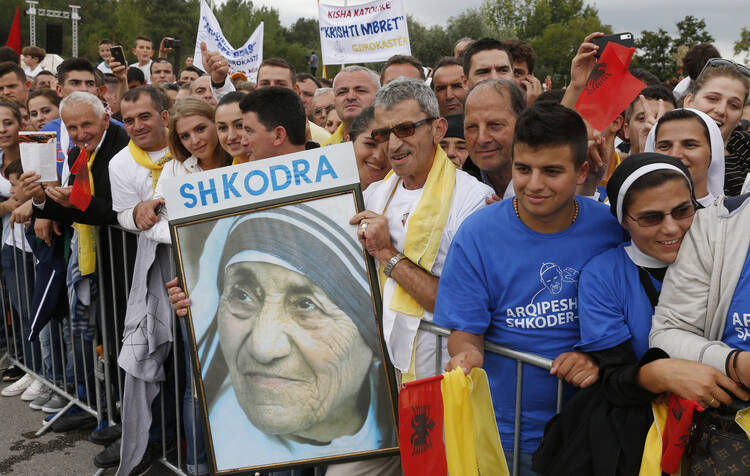Pope Francis has opened the door to the canonization of Blessed Mother Teresa of Calcutta. He did so this afternoon, Dec. 17, when he recognized the miraculous cure of a Brazilian man that took place at the end of 2008.
The news was broken unofficially this evening by the Italian Catholic daily Avvenire's well informed columnist, Stefania Falasca, but it was not unexpected. It came after the commission of cardinals and bishops of the Congregation for the Causes of Saints gave their unanimous positive verdict on Dec. 15, thereby confirming the unanimous conclusion reached by the congregation’s own medical board on Sept. 10 that the Brazilian man’s cure could not be explained scientifically.
The official announcement from the Vatican will be made after the next public consistory (probably in the coming days) at which Francis will authorize the publication of the decree recognizing the miracle. It’s likely that the congregation will also give the date for her canonization then, but most people in Rome expect it to take place on Sept. 4. But it’s not yet clear whether this will take place in Calcutta (as the Indian bishops hope) or in Rome.
According to the report in Avvenire, the miraculous cure took place in the diocese of Santos in Brazil and concerns a local man, then 35, whom doctors concluded was at the death’s door due to “multiple cerebral abscesses with hydrocephalous obstruction.” The man had already “undergone a kidney transplant and was in therapy with immune- suppressors.” The diagnosis left little hope for the man’s life.
The man (whose identity has been withheld) is an engineer and he had only recently got married when soon after his health problems began and by the end of 2008 he was diagnosed with eight abscesses. His condition seriously worsened with the emergence of hydrocephaly and he fell into a coma on Dec 9 and was taken for surgery. At the pleading of his young wife, many people started praying to Mother Teresa for him to intercede with God for his cure, and they did so especially on this day.
That day the operation had to be postponed for a short time due to technical reasons, and when the doctor came back to carry out the surgery 30 minutes later, he found the man sitting up and asking what he was doing there in the operating theatre. The doctor was stunned, and then examined him only to discover that he was without any sign of his major health problems. At that very hour, the man’s wife and other people were praying together with a priest to Mother Teresa in the hospital chapel. No one had any doubt, the miraculous cure was attributed to Mother Teresa of Calcutta, who was born in Skopje (the current capital of the Republic of Macedonia) to parents of Albanian descent, and baptized as Agnes Gonxha Bojaxhiu, in 1910. She was awarded the Nobel Prize for Peace in 1979, and died in India in 1997, where she was given a state funeral. John Paul II beatified her in 2003.
Pope Francis, who knew Mother Teresa reasonably well having sat beside her at a month long synod, recognized the miracle just before 6.00 p.m. (Rome time) when he signed the decree after the dossier was brought to him. He will certainly have welcomed and cherished this birthday gift.
Millions throughout the world have long considered this small, courageous woman, who spent much of her life in India among the poor and discarded, a saint, but the official verdict of the Church goes beyond that popular recognition and takes it to another level. During her life she gave extraordinary witness to the mercy and love of God for the poorest and most discarded in this world, and it is truly fitting that she be canonized in this Jubilee Year of Mercy.








